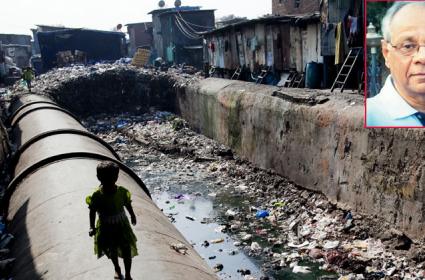What Kind Of Efforts Can Clean Up Mumbai?

Mahesh Vijapurkar
When 14 lakh people have been warned against littering, over five lakh have been fined, and the fines collected adds up to Rs 8.27 crore in just one year, it is normal to assume that a city has become at least cleaner if not totally free of litter. But that has not been the case with Mumbai, the country’s major urban space.
All the warnings were issued and fines collected by squads set up by the Municipal Corporation of Greater Mumbai, easily the richest in the country, and with a poor record of spending but with massive fixed deposits held in banks. Many uniformed personnel, not the civic body’s own staff but outsourced, carry receipt books and keep an eye on the careless who dirty the city.
The city is home to 1.24 crore people which also sees the city’s daytime population bloat substantially because hoards come in from outside – extended suburbs which are actually other cities with their own local bodies – to work in Mumbai daily. They have no ownership of the city, not that other residents, except for some successful pro-city NGOs.
The grand city’s huge contradiction is the teeming slums which barely figure in the scheme of things of the civic body. Toilets with as many as 300 users per seat with minimal water availability for flushing, non-collection of garbage etc adds to the hygiene woes of the metropolis. But the clean-up marshals don’t visit the slums. They stick to high footfall areas like stations.
Slums are a contradiction of the concept of a bright and shining Mumbai. Glass-fronted office towers and residential skyscrapers which stay cheek-by-jowl with slums which host about a half of the city’s population in about a tenth of its land area and is known for filth. The slums are not part of the city’s planning paradigm and no wonder it cannot be called a clean city.
But that is about garbage collection from the slums, providing water to drink and to flush in the common toilets which barely function and that is hardly in the peripheral vision of the city managers. Slums are lands on which builders can build free replacement housing, build extra for open market and pocket huge profits. Slums are seen as real estate, not habitats of people.
Even the spaces which are in the grandest part of Mumbai, which is South Mumbai with both colonial buildings and business districts, the seafronts, and huge maidans are unkempt despite the clean-up marshals on the job. They fine Rs 200 for dropping anything on the street or spitting, Rs 200 for defecating, and Rs 500 for allowing the pet dog to poo. People argue but mostly pay up.
The city administration may claim that the city is cleaner than what it was because hawkers – another menace who do not let people use the footpaths for walking by pitching up their stalls on them – make sure they carefully bin their wastes. But that is part of the story. The other is the attitude of the people: if it is not my home, it is a place to dirty by throwing stuff.
Curiously, the day the media report with official statistics of penalties surfaced, another spoke about the civic body’s plan to cover the major nallahs with polycarbonate sheets to prevent garbage being thrown in them. These nallahs are storm water exits and easily the biggest garbage dumping space. When they choke and curbs water flow, people point fingers at the city government, not at themselves as the cause.
Cleanliness is really missing when people think nothing of just clearing the throat and spitting anywhere. It does not matter if that barely misses a passer-by. Both are so used to it that spitting, so common among paan eaters and tobacco chewers that it is seen as a usual practice except that the clean-up marshals see one doing it. A huge force, perhaps a thousand times stronger, would be needed to instil cleanliness as a habit.














